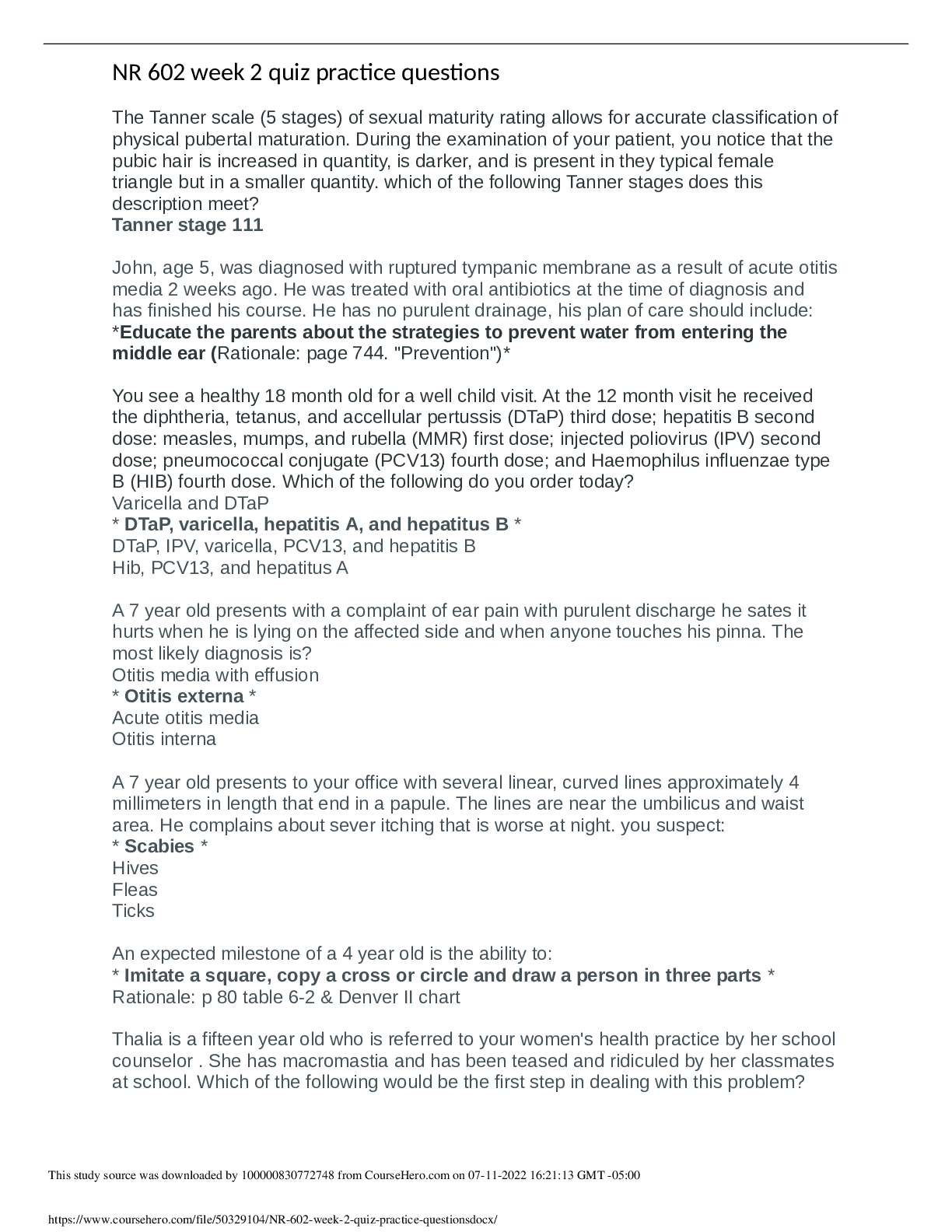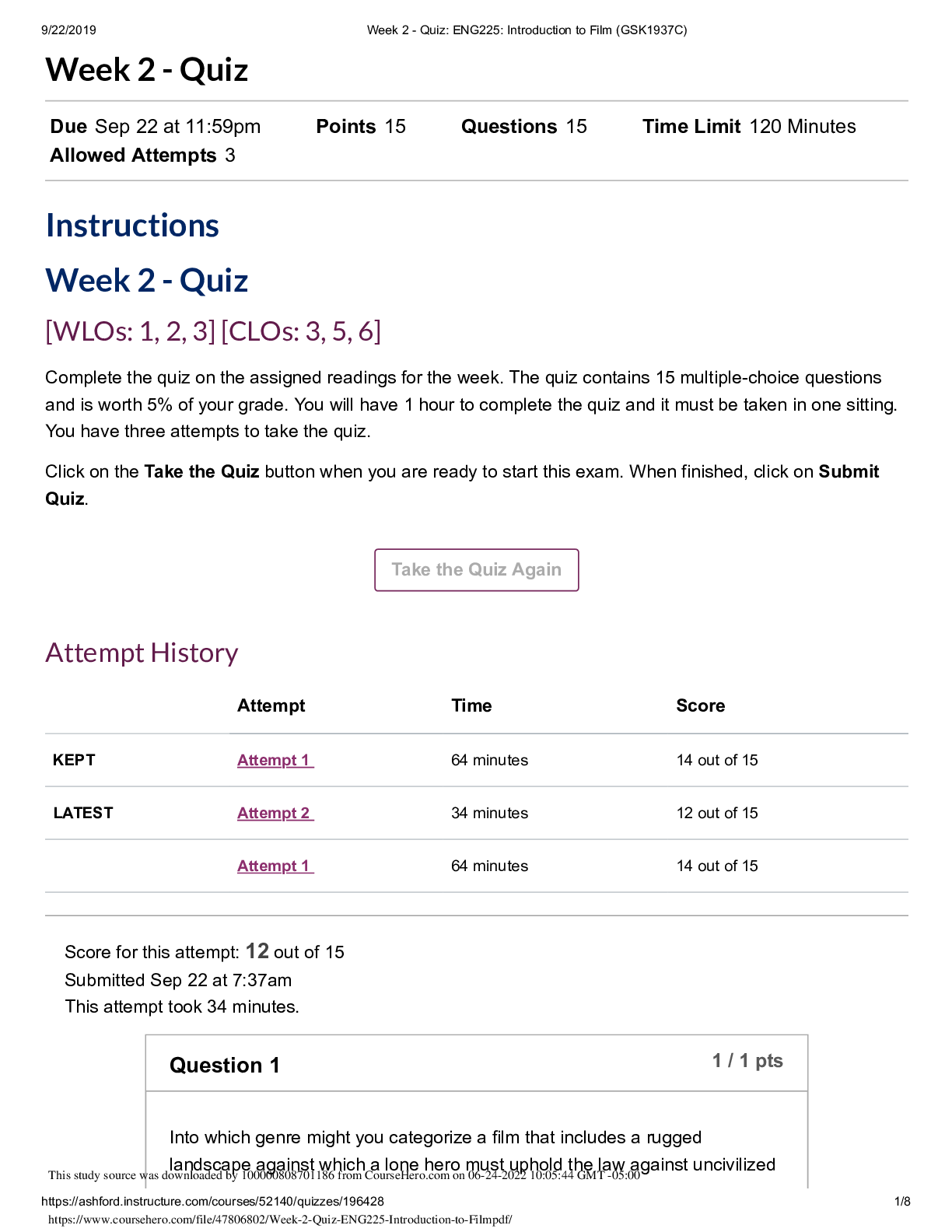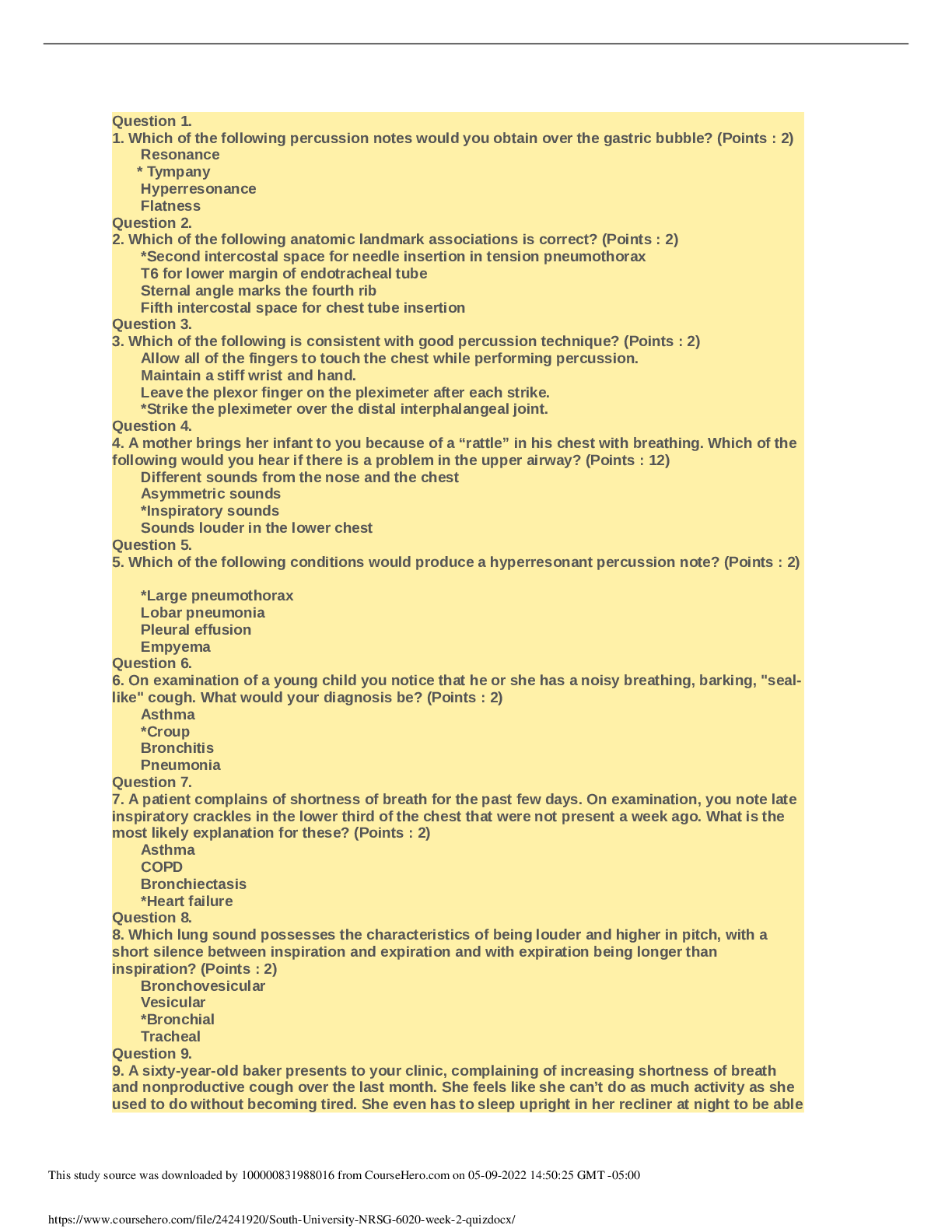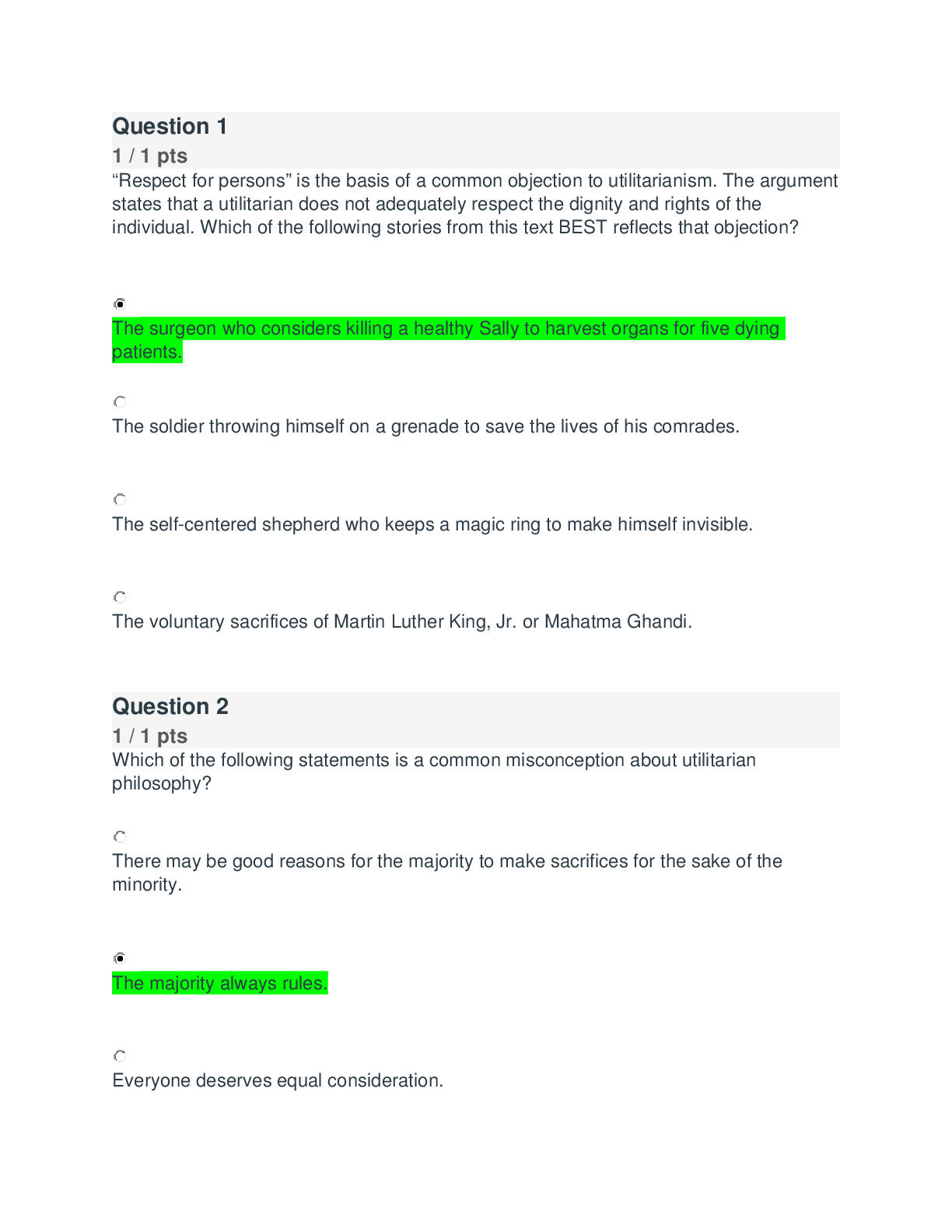*NURSING > QUESTIONS & ANSWERS > NR 511 Week 2 Quiz Practice Questions-Answers(HEENT Eye Problem) (All)
NR 511 Week 2 Quiz Practice Questions-Answers(HEENT Eye Problem)
Document Content and Description Below
Question 1. Which of the following statements about macular degeneration is not true? Question 2. You prescribe Levaquin (levofloxacin) for a severe sinus infection. What is not a possible adverse r... eaction to this medication? Question 3. Which of the following is not a complication of untreated group A streptococcal pharyngitis? Question 4. What is the most common cause of epistaxis? Question 5. Which of the following is not recommended for hoarseness? Question 6. Aaron, age 4, is brought in to the clinic by his father. His tympanic membrane is perforated from otitis media. His father asks about repair of the eardrum. How do you respond? Question 7. A 44-year-old banker comes to your office for evaluation of a pulsating headache over the left temporal region, and he rates the pain as an 8 on a scale of 1 to 10. The pain has been constant for the past several hours and is accompanied by nausea and sensitivity to light. He has had frequent, though less severe, headaches for many years, and they are usually relieved by over-the-counter medicines. He is unclear as to a precipitating event but notes that he has had visual disturbances before each headache and he has been under a lot of stress in his job. Based on this description, what is the most likely … of this type of headache? Question 8. Johnson, a 54-year-old accountant, presents to the office with a painful red eye without discharge. You should suspect: Question 9. Mandy, 44, was … of flu 1 day ago and wants to start on the “new flu medicine” right away. What do you tell her? Question 10. Marcia, age 4, is … in to the office by her mother. She has a sore throat, difficulty swallowing, copious oral secretions, respiratory difficulty, stridor, and a temperature of 102°F but no pharyngeal erythema or cough. What do you suspect? Question 11. Clark, age 78, is being … with timolol maleate (Timoptic) drops for his chronic open-angle glaucoma. While performing a new client history and physical, you note that he is taking other medications. Which medication would you be most … about? Question 12. You are … a first grader and find that the tonsils are touching the uvula. How would you grade this finding? Question 13. Nystatin (Mycostatin) is ordered for Michael, a 56-year-old banker who has an oral fungal infection. What instructions for taking the medication do you give Michael? Question 14. Mario, a 17-year-old high school student, came to the office for evaluation. He is complaining of persistent sore throat, fever, and malaise not relieved by the penicillin therapy prescribed recently at the urgent care center. As the nurse practitioner, what would you order next? Question 15. Cynthia, a 31-year-old woman with a history of depression, is seen in the office today for complaints of headaches. She was recently promoted at her job, and this has caused increased stress. She describes the headache as a tightening (viselike) feeling in the temporal and nuchal areas. The pain is bilateral and tends to wax and wane. It started approximately 2 days ago and is still present. What kind of headache is she describing? Question 16. Regular ocular pressure testing is … for older adults taking: Question 17. In a young child, unilateral purulent rhinitis is most often caused by: Question 18. Samantha, age 12, presents with ear pain. When you begin to assess her ear, you tug on her normal-appearing auricle, eliciting severe pain. This leads you to suspect: Question 19. Ellen, a 56-year-old social worker, is seen by the nurse practitioner for complaints of fever; left-sided facial pain; moderate amounts of purulent, malodorous nasal discharge; and pain and headache when bending forward. The symptoms have been occurring for approximately 6 days. On physical assessment, there is marked redness and swelling of the nasal passages and tenderness/pain on palpation over the cheekbones. The nurse practitioner should suspect: Question 20. You diagnose 46-year-old Mabel with viral conjunctivitis. Your treatment should include: Question 21. A 25-year-old male presents with “bleeding in my eye” for 1 day. He awoke this morning with a dark area of redness in his eye. He has no visual loss or changes. He denies constitutional symptoms, pruritus, drainage, or recent trauma. The redness presents on physical exam as a dark red area in the patient’s sclera of the right eye only and takes up less than 50% of the eye. The patient’s remaining sclera is clear and white. He also notes he was drinking alcohol last night and vomited afterward. What is the best treatment? Question 22. Which of the following is not a cause of conductive hearing loss? Question 23. You are the nurse practitioner caring for Martha, a 47-year-old accountant. You have made a … of acute sinusitis based on Martha’s history and the fact that she complains of pain behind her eye. Which sinuses are … ? Question 24. Marlene, a 57-year-old cashier, comes to the clinic because she is unable to differentiate between sharp and dull stimulation on both sides of her face. You suspect: Question 25. While doing a face, head, and neck examination on a 16-year-old patient, you note that the palpebral fissures are abnormally narrow. What are you examining? Question 26. Your client, a 72-year-old smoker of 50 years, is at the office today for a routine physical. During your inspection of the oral mucosa, you discover a white lesion on the lateral surface of the tongue that you suspect to be cancerous. You document your finding as: Question 27. Mia, a 27-year-old school teacher, has a 2-day history of severe left ear pain that began after 1 week of upper respiratory infection (URI) symptoms. On physical examination, you find that she has acute otitis media (AOM). She has a severe allergy to penicillin. The most appropriate antimicrobial option for this patient is: Question 28. A 64-year-old obese woman comes in complaining of difficulty swallowing for the past 3 weeks. She … that “some foods get stuck” and she has been having “heartburn” at night when she lies down, especially if she has had a heavy meal. Occasionally, she awakes at night coughing. She denies weight gain and/or weight loss, vomiting, or change in bowel movements or color of stools. She denies alcohol and tobacco use. There is no pertinent family history or findings on review of systems (ROS). Physical examination is normal, with no abdominal tenderness, and the stool is occult blood (OB) negative. What is the most likely … ? Question 29. Johnson, age 69, has had Meniere disease for several years. He has some hearing loss but now has persistent vertigo. What treatment might … to relieve the vertigo? Question 30. Marjorie, age 37, has asthma and has been … she has nasal polyps. What do you tell her about them? Question 31. April, age 50, presents with soft, raised, yellow plaques on her eyelids at the inner canthi. She is concerned that they may be cancerous skin lesions. You tell her that they are probably: Question 32. Which manifestation is … with carbon monoxide poisoning? Question 33. Kathleen, age 54, has persistent pruritus of the external auditory canal. External otitis and dermatological conditions, such as seborrheic dermatitis and psoriasis, have been ruled out. What can you advise her to do? Question 34. Kevin, age 26, has AIDS and presents to the clinic with complaints of a painful tongue covered with what look like creamy white, curdlike patches overlying erythematous mucosa. You are able to scrape off these “curds” with a tongue depressor, which assists you in making which of the following … ? Question 35. Sally, age 19, presents with pain and pressure over her cheeks and discolored nasal discharge. You cannot transilluminate the sinuses. You suspect which sinus to be … ? Question 36. A 10-year-old male in 5th grade presents to the pediatric office with his mother complaining of itchy and red eyes for 1 day. The patient complains of watery drainage in both eyes, associated with repetitive itching. On physical exam, he has no fever or constitutional symptoms. His vision is normal, with no decrease in extraocular movements. The patient has a sibling that just started day care recently. He also has bilateral preauricular lymph nodes that are … What is the patient’s … ? Question 37. A 75-year-old African American male presents to your family practice office complaining of visual impairment. He has worn corrective lenses for many years but has … that his vision has gotten progressively worse the past 6 months. He denies pain. He states his vision is worse in both eyes in the peripheral aspects of his visual field. He also notes trouble driving at night and halos around street lights at night. You test his intraocular pressure, and it is 23 mm Hg. What is his most likely … ? Question 38. Which of the following statements about macular degeneration is not true? Question 39. What is the most common bacterial pathogen … with acute otitis media? Question 40. Alexandra, age 34, was treated with oral antibiotics 2 weeks ago for a urinary tract infection. She is seen in the office today for a follow-up visit. On physical examination, the nurse practitioner notices that she has some painless, white, slightly raised patches in her mouth. This is probably caused by: Question 41. When you are … the internal structure of the eye of your 59-year-old patient, the absence of a red reflex may indicate: Question 42. When the Weber test is performed with a tuning fork to assess hearing and there is no lateralization, the nurse practitioner should document this finding as: Question 43. What significant finding(s) in a 3-year-old child with otitis media with effusion would prompt more aggressive treatment and referral? Question 44. Which of the following conditions produces sharp, piercing facial pain that lasts for seconds to minutes? Question 45. Mary, age 82, presents with several eye problems. She states that her eyes are always dry and look “sunken in.” What do you suspect? Question 46. At the clinic, you are assessing Kyle, a 4-month-old baby, for the first time and notice that both eyes are turning inward. What is this … ? Question 47. You diagnose acute epiglottitis in Sally, age 5, and immediately send her to the local emergency room. Which of the following symptoms would indicate that an airway obstruction is imminent? Question 48. A 75-year-old female presents to your office complaining of dizziness and hearing loss. The patient states she awoke yesterday with dizziness, which she described as feeling the room spinning. She also notes intermittent ringing in her ears. On physical exam, the patient has lateralization of her hearing loss to the unaffected ear. Rinne test shows air conduction lasts longer than bone conduction. What is the next step in helping this patient’s symptoms? Question 49. Which of the following is not a cause of conductive hearing loss? Question 50. A 20-year-old male presents to your primary care clinic. This patient is a college student. He complains of fatigue, sore throat, and low-grade fever for 3 days. On physical exam, he has a temperature of 100.7°F. His ear exam is normal. His nose and throat exam shows mild erythema of the nasal mucosa and edematous, enlarged tonsils bilaterally, with erythema of the pharyngeal wall and tonsillar exudates. He has inflamed posterior cervical lymph nodes. He has a mild nonproductive cough and clear lung exam. What is his most likely … ? Question 51. Mattie, age 64, presents with blurred vision in 1 eye and states that it felt like “a curtain came down over my eye.” She doesn’t have any pain or redness. What do you suspect? Question 52. A 65-year-old man presents complaining of a left-sided, deep, throbbing headache and mild fatigue. On examination, the client has a tender, tortuous temporal artery. You suspect giant cell arteritis (GCA), or temporal arteritis. What is the least invasive procedure to help with … ? Question 53. Sharon, a 47-year-old bank teller, is … by the nurse practitioner in the office for a red eye. You are trying to decide between a … of conjunctivitis and iritis. One distinguishing characteristic between the two is: Question 54. Cataracts are a common occurrence in patients over 60 years of age. You counsel your patient that the best cure for cataracts is: Question 55. Erica, age 39, has a sudden onset of shivering, sweating, headache, aching in the orbits, and general malaise and misery. Her temperature is 102°F. The nurse practitioner … her with influenza (flu). What is your next course of action? Question 56. A 62-year-old woman presents to your clinic with a sudden right-sided headache that is worse in her right eye. She states that her vision seems blurred, and her right pupil is dilated and slow to react. The right conjunctiva is markedly … , and the eyeball is firm. You screen her vision and find that she is 20/30 OS and 20/30 OD. She most likely has: Question 57. How would you describe the cervical lymphadenopathy associated with asymptomatic human immunodeficiency virus (HIV) infection? Question 58. A 6-year-old female presents to your pediatric office with her mother complaining of right ear pain for 3 days. This pain resolved with Tylenol. The patient has also had noted fevers of 101.3°F over the last 2 nights. The patient had a nonproductive cough for 7 days prior to the ear pain. On physical exam, the patient has tenderness with tugging on the auricle of the ear. The tympanic membrane is not mobile with pneumatic otoscopy and is erythematous and full. The patient has no drainage from the ear and no mastoid tenderness. What is the next step? Question 59. Jill, a 34-year-old bank teller, presents with symptoms of hay fever. She complains of nasal congestion, runny nose with clear mucus, and itchy nose and eyes. On physical assessment, you observe that she has pale nasal turbinates. What is your … ? Question 60. The most common cause of a white pupil (leukokoria or leukocoria) in a newborn is: Question 61. Mallory brings her 4-week-old infant to the office because she noticed small, yellow-white, glistening bumps on her infant’s gums. She says they look like teeth, but she is … that they may … cancer. You diagnose these bumps as: Question 62. A 25-year-old client who plays in a band complains that he finds it difficult to understand his fellow musicians at the end of a night of performing, a problem that is compounded by the noisy environment of the club. These symptoms are most characteristic of which of the following? Question 63. The antibiotic of choice for recurrent acute otitis media (AOM) and/or treatment failure in children is: Question 64. An 80-year-old woman comes in to the office with complaints of a rash on the left side of her face that is blistered and painful and accompanied by left-sided eye pain. The rash broke out 2 days ago, and she remembers being very tired and feeling feverish for a week before the rash appeared. On examination, the rash follows the trigeminal nerve on the left, and she has some scleral injection and tearing. You suspect herpes zoster ophthalmicus. Based on what you know to … complications of this disease, you explain to her that she needs: Question 65. Max, age 35, states that he thinks he has an ear infection because he just flew back from a business trip and feels unusual pressure in his ear. You diagnose barotrauma. What is your next action? [Show More]
Last updated: 1 year ago
Preview 1 out of 28 pages
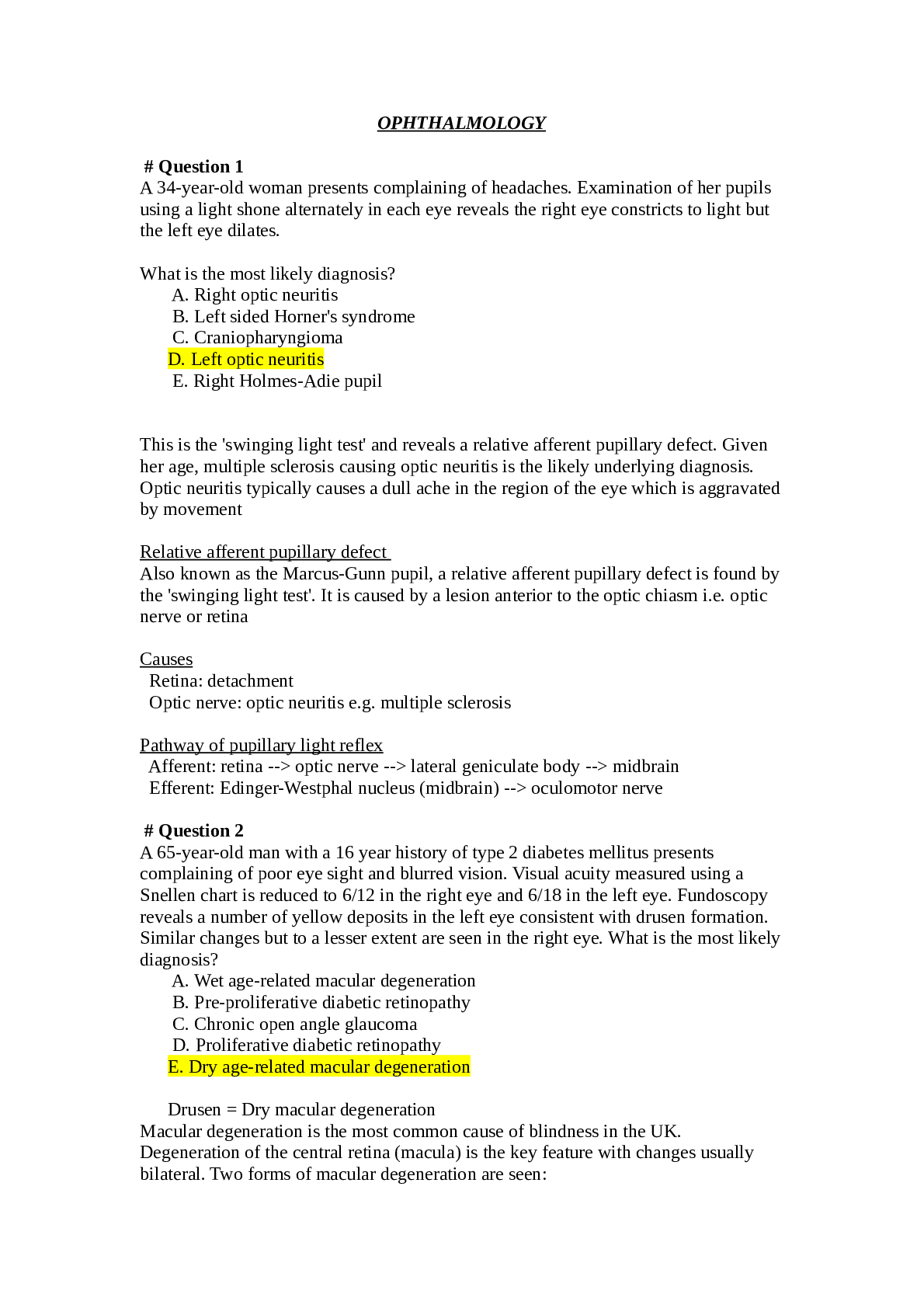
Reviews( 0 )
Document information
Connected school, study & course
About the document
Uploaded On
Aug 05, 2021
Number of pages
28
Written in
Additional information
This document has been written for:
Uploaded
Aug 05, 2021
Downloads
0
Views
43


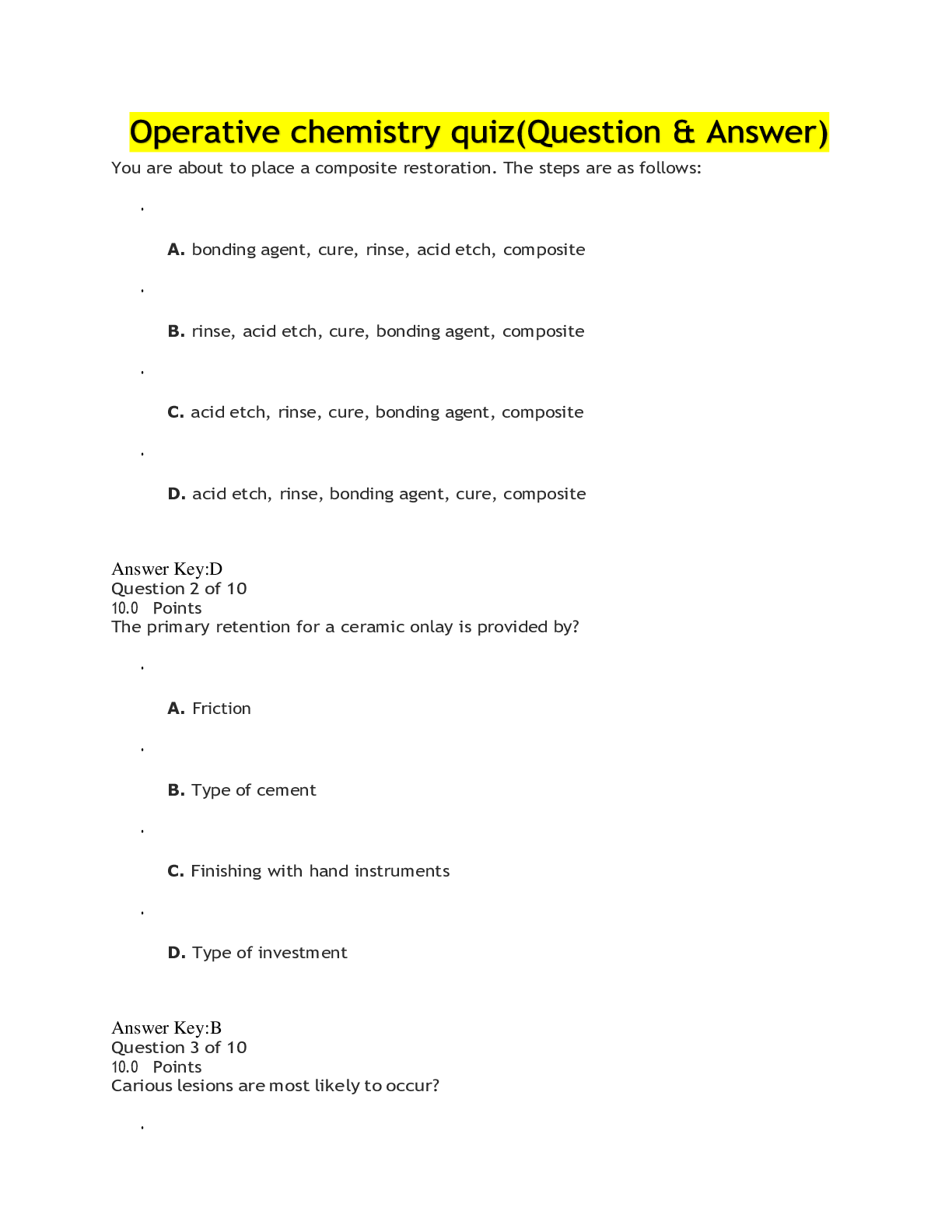
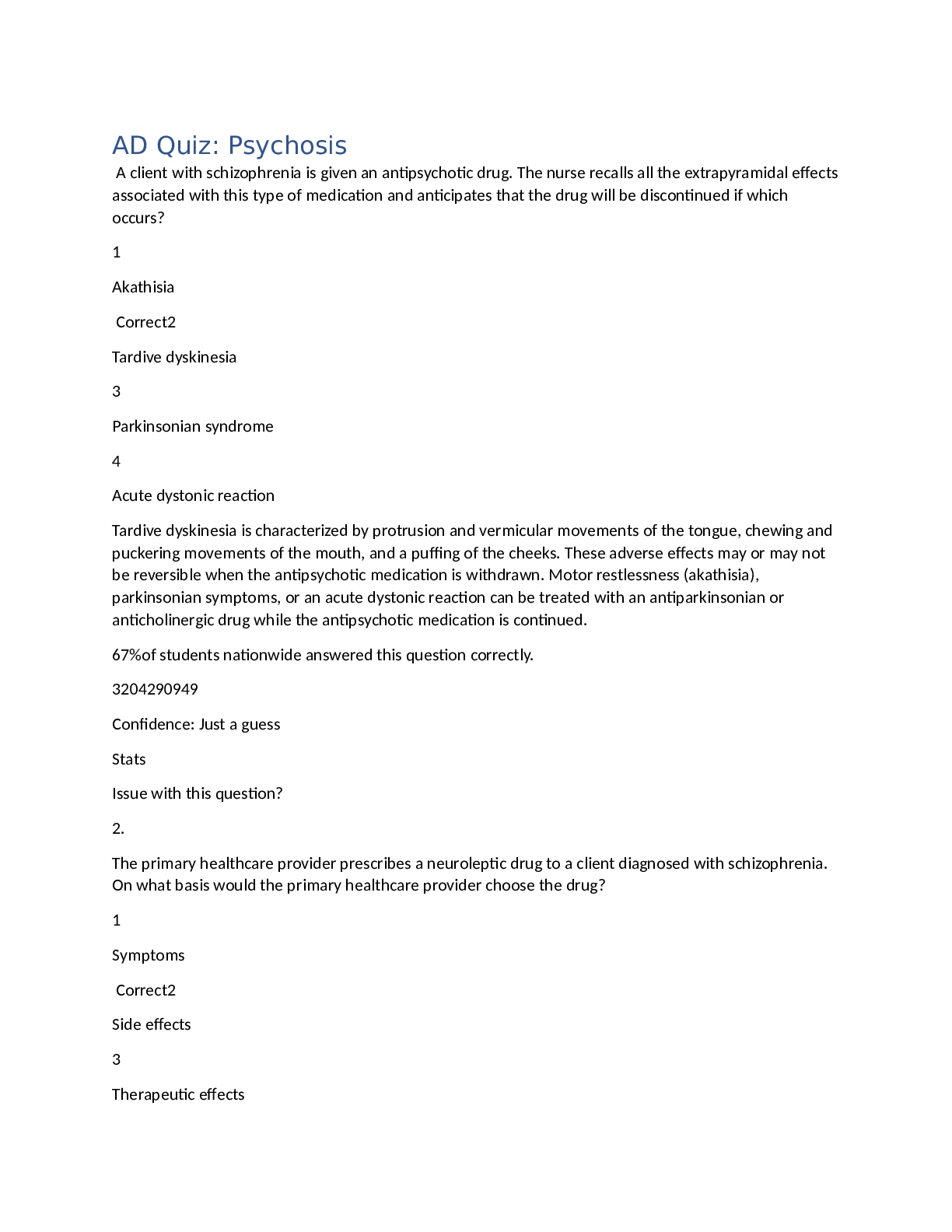

 q&a.png)
 (1).png)
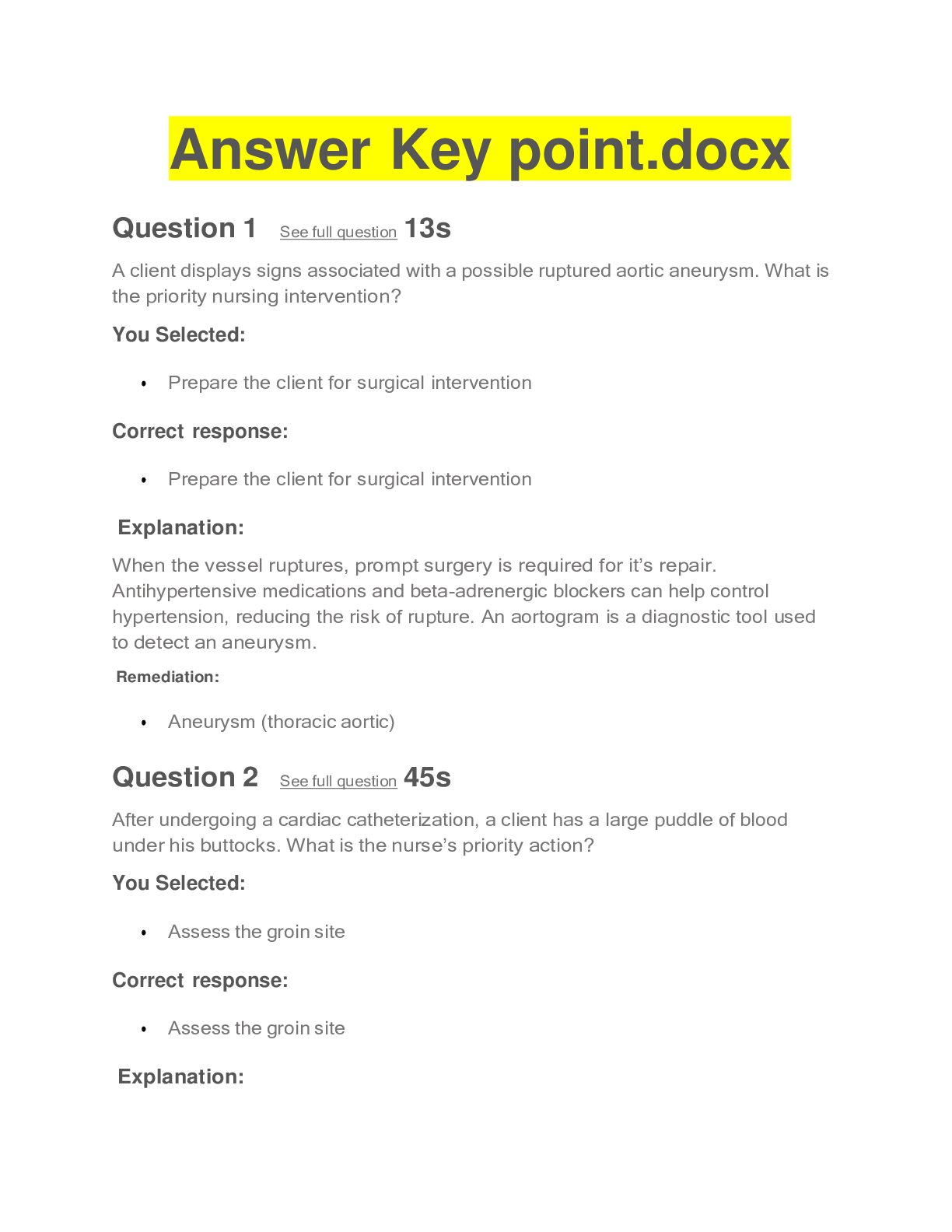
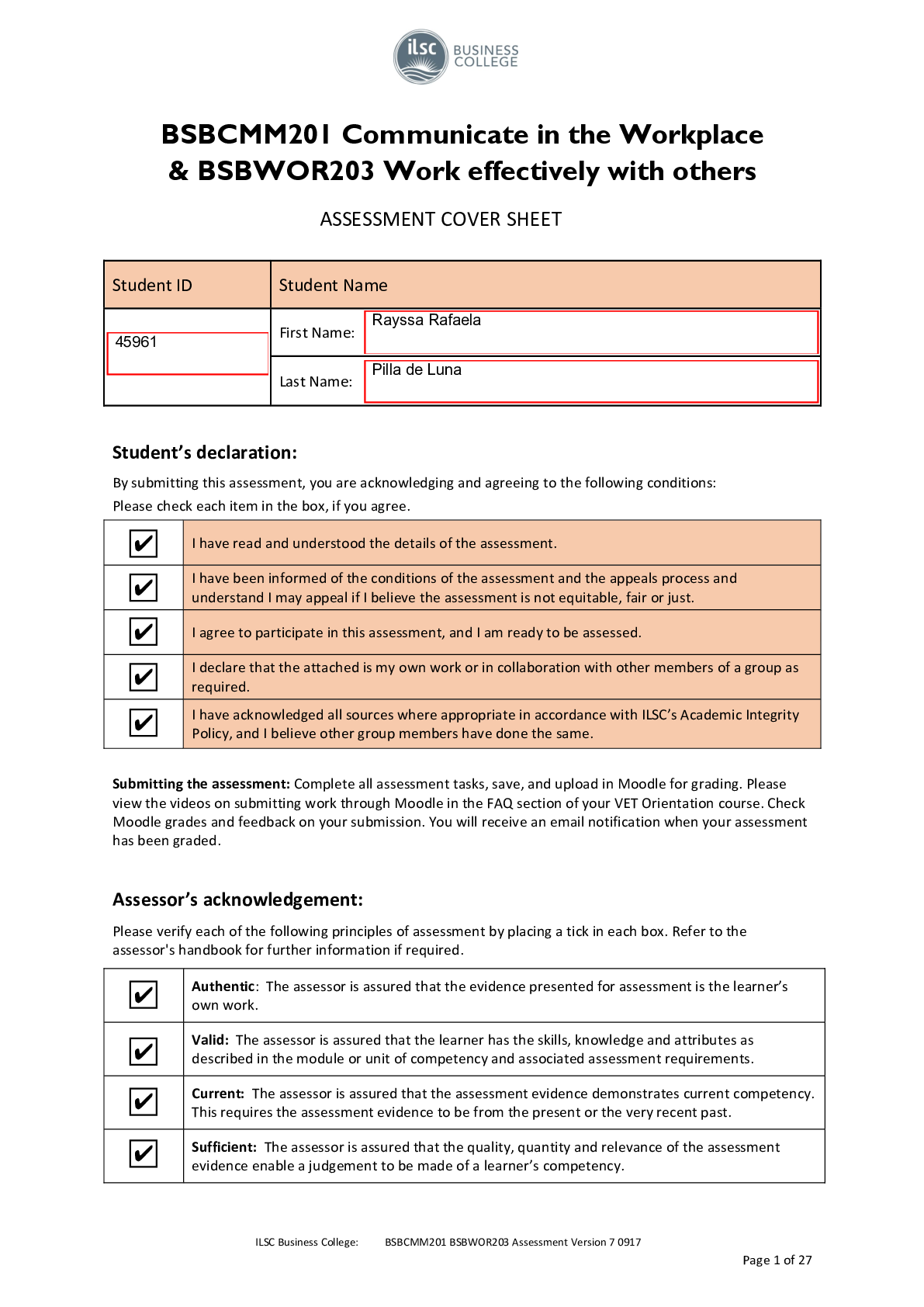
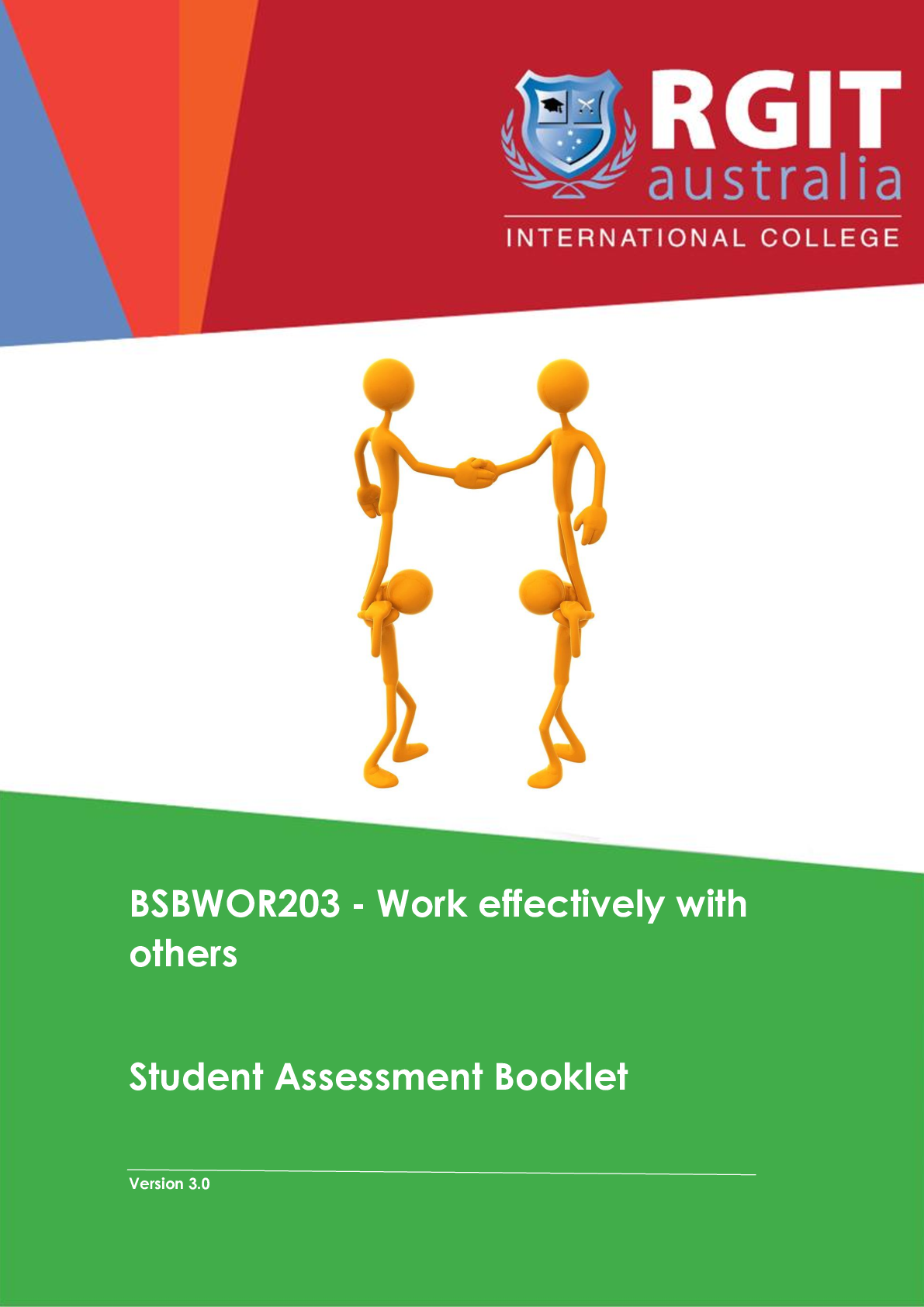
.png)
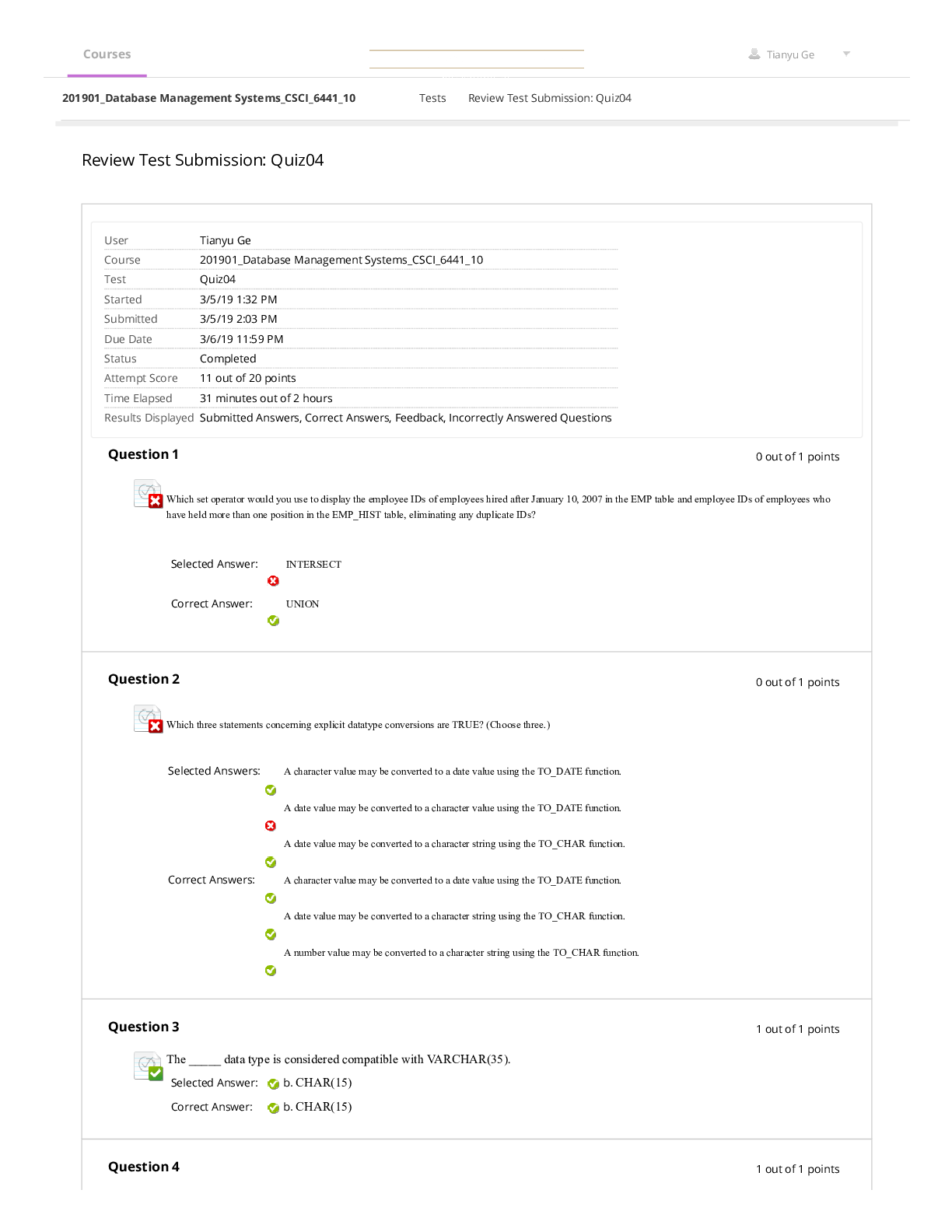

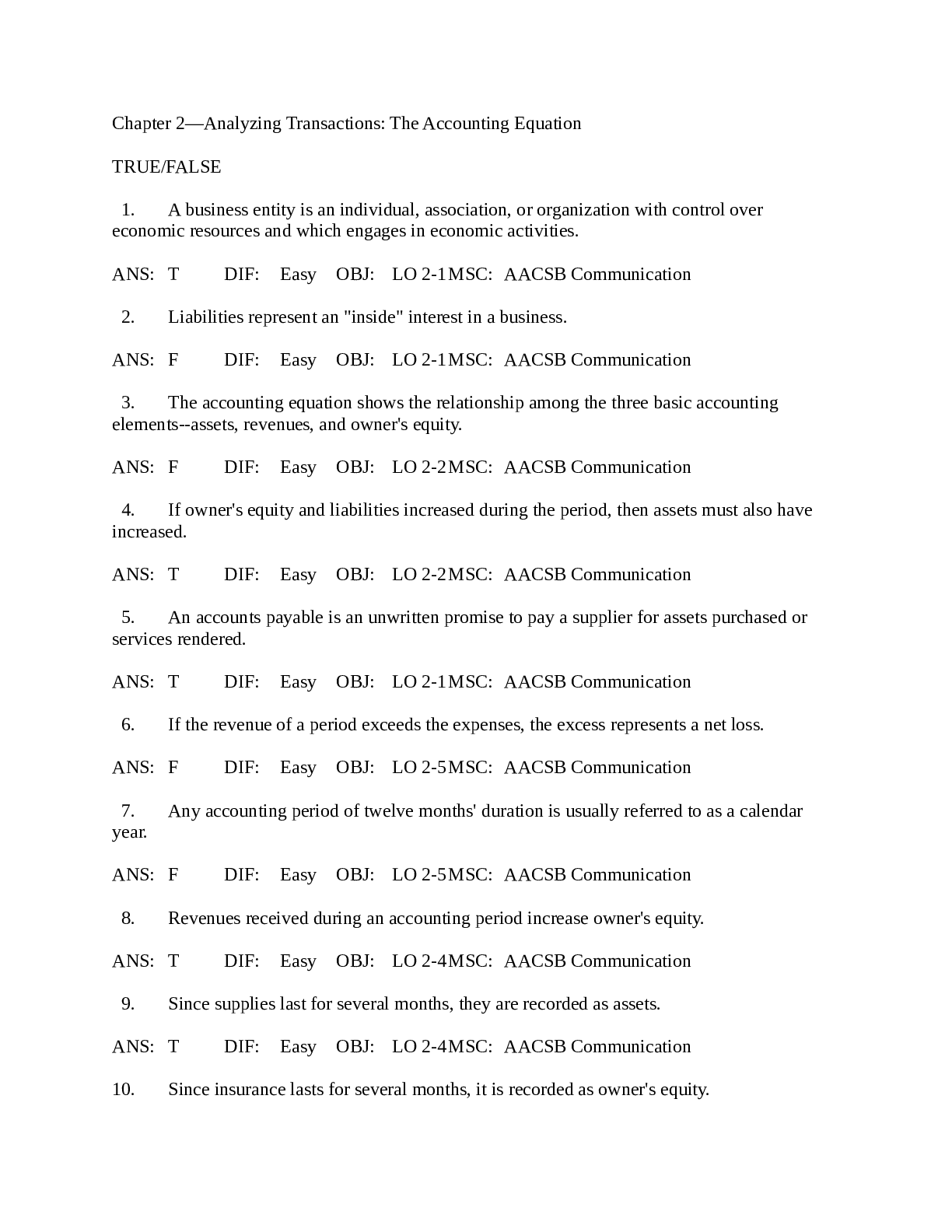
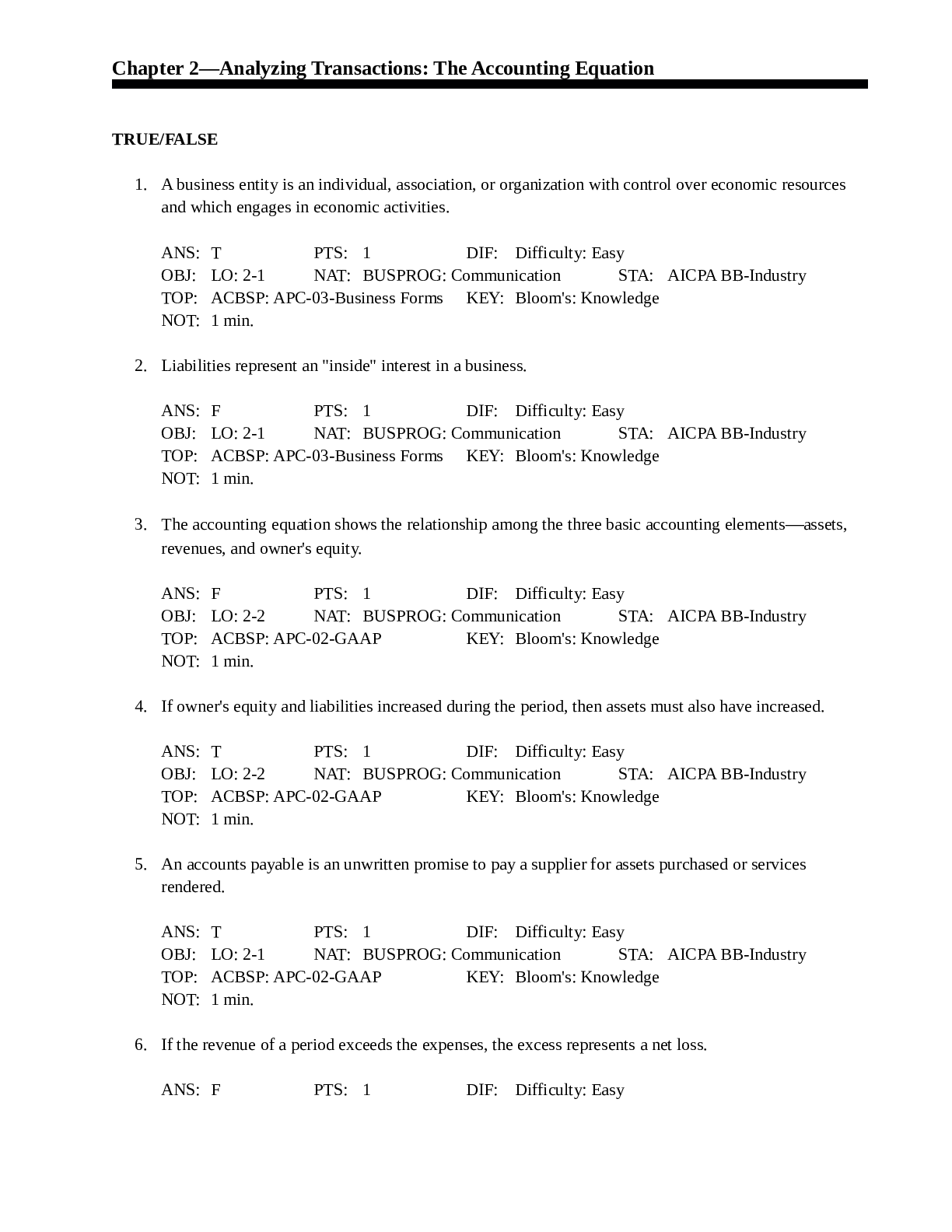
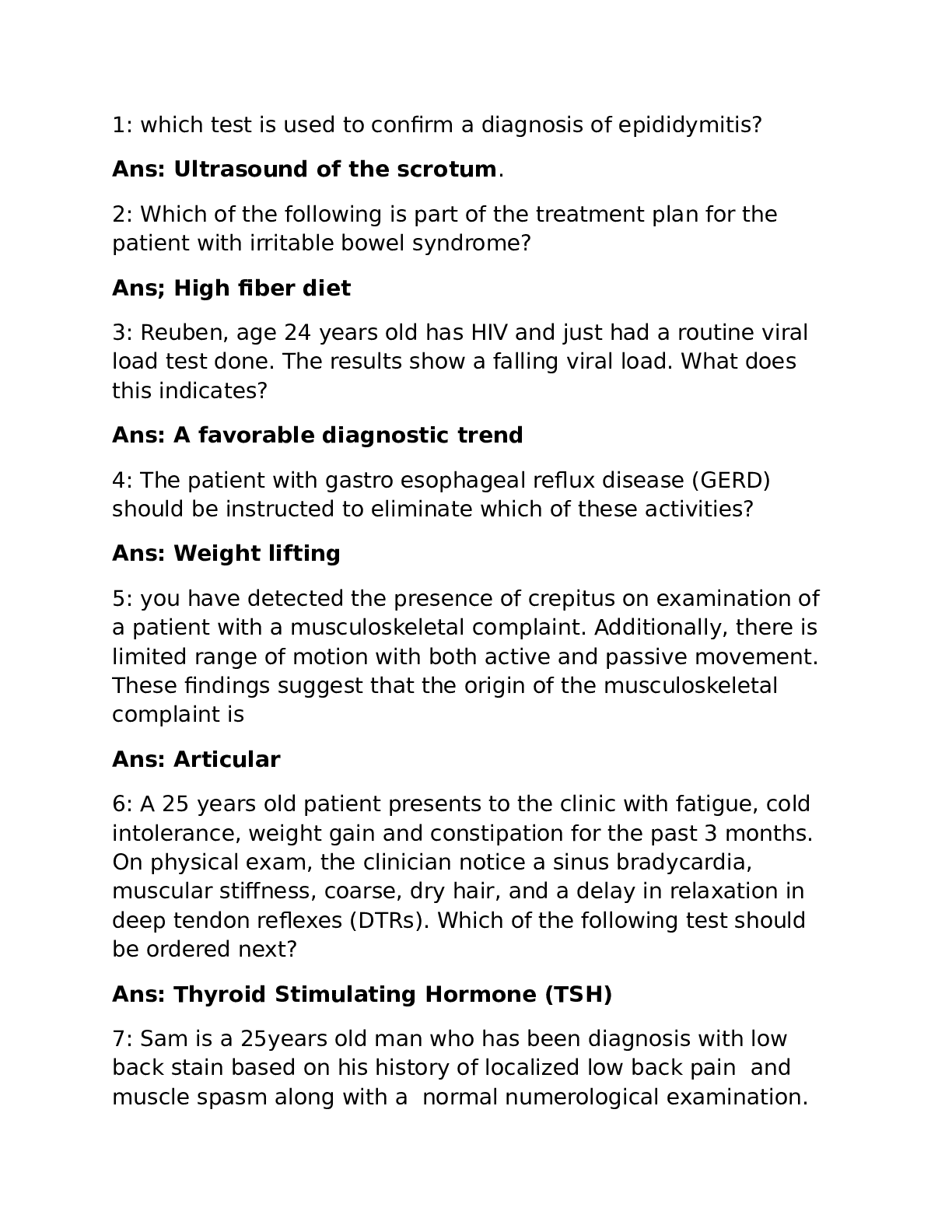
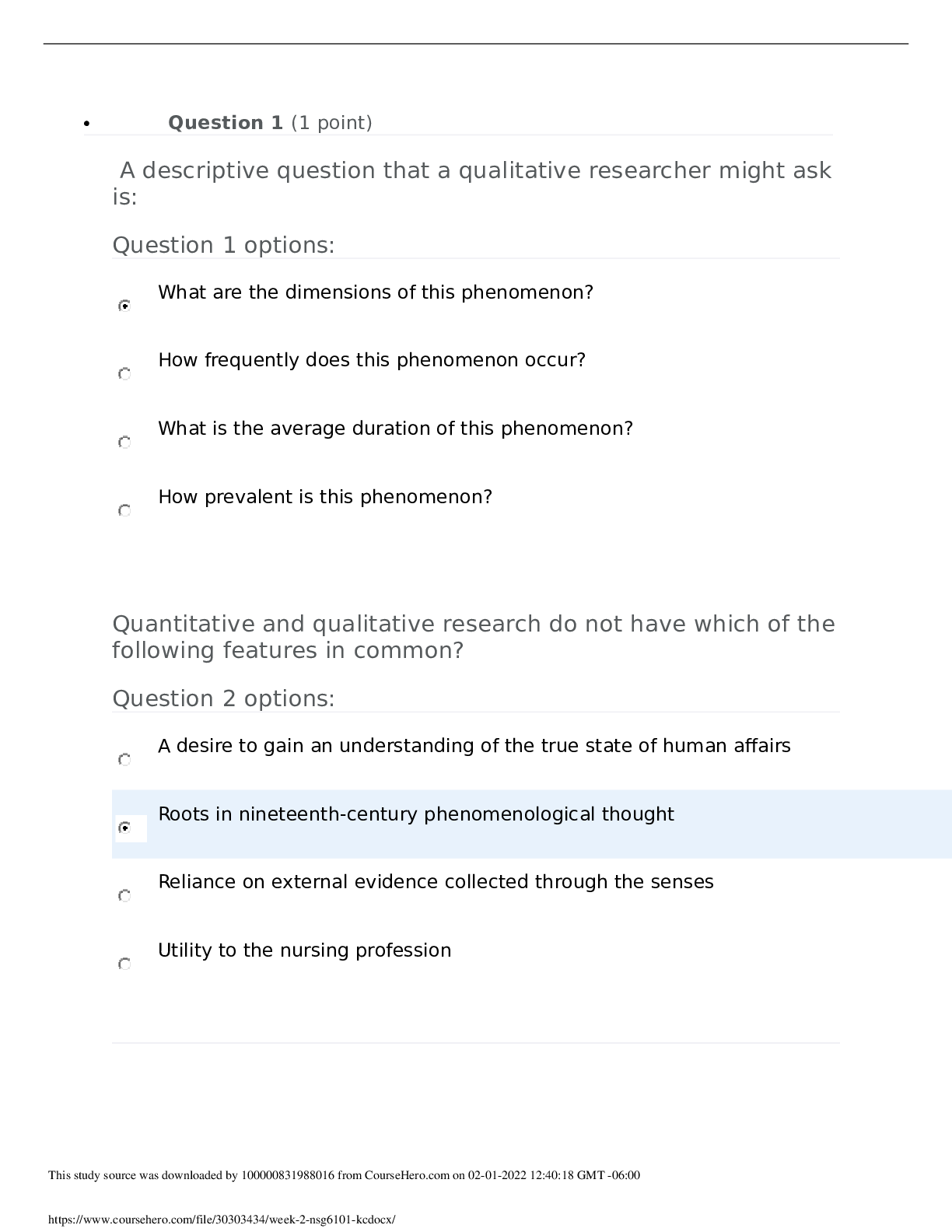
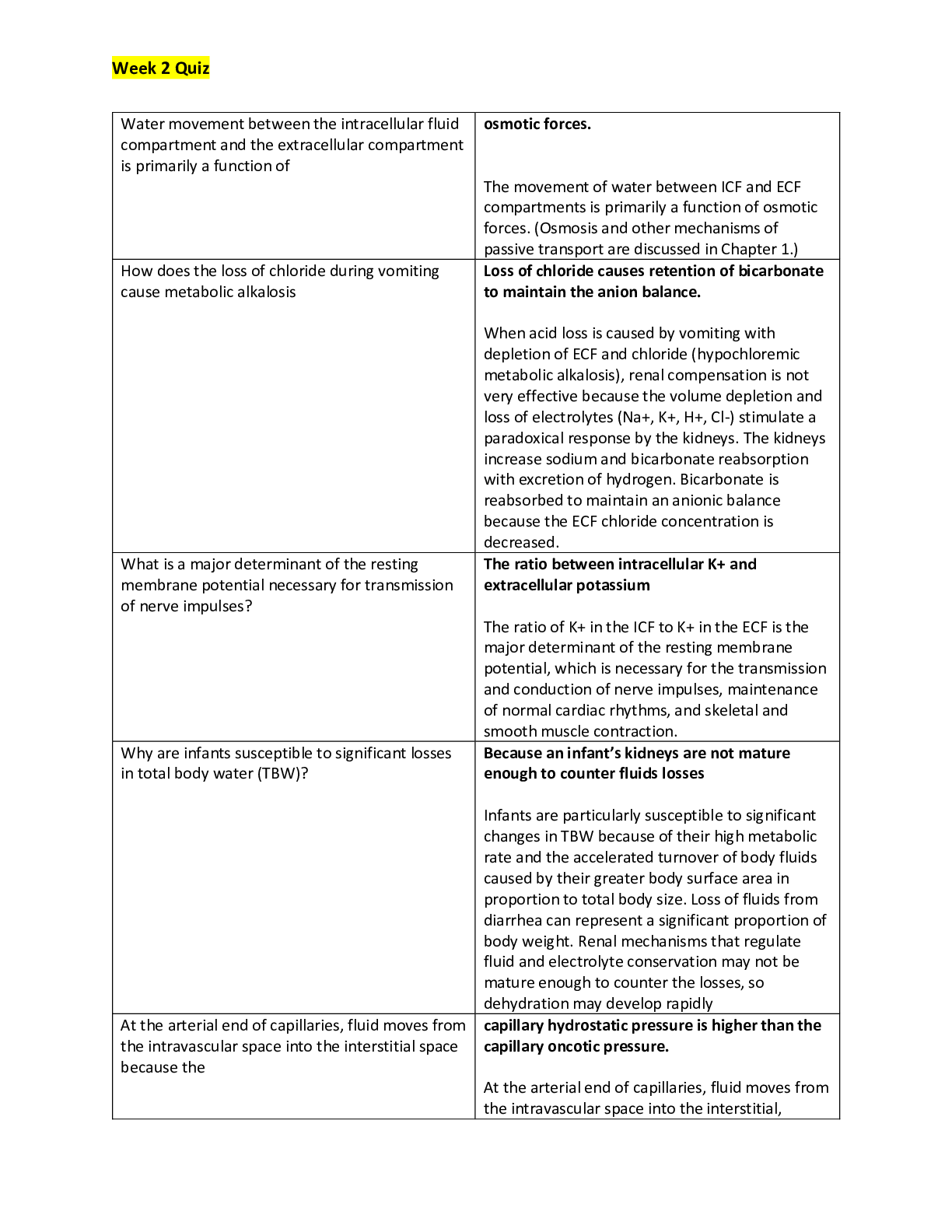
.png)

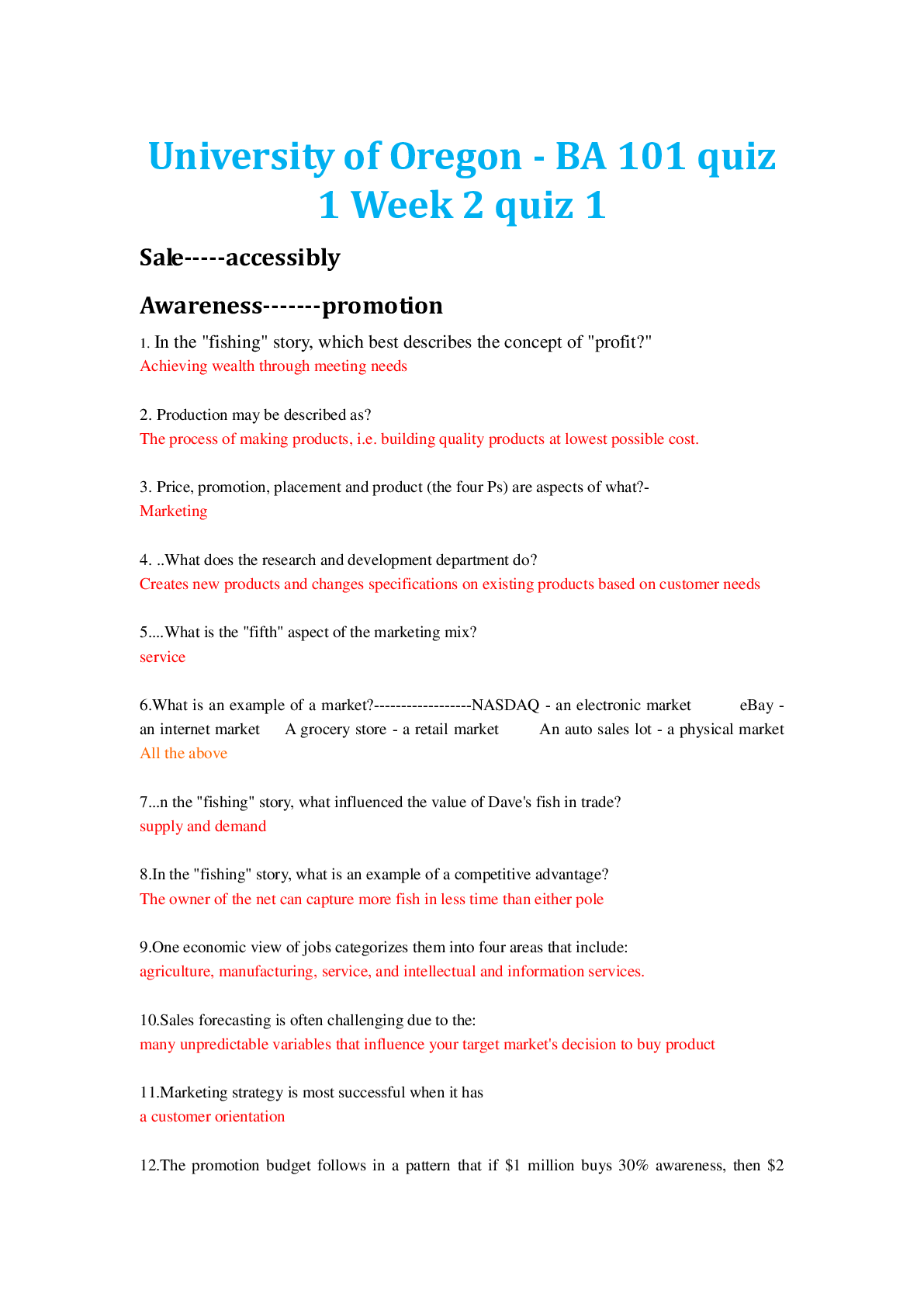


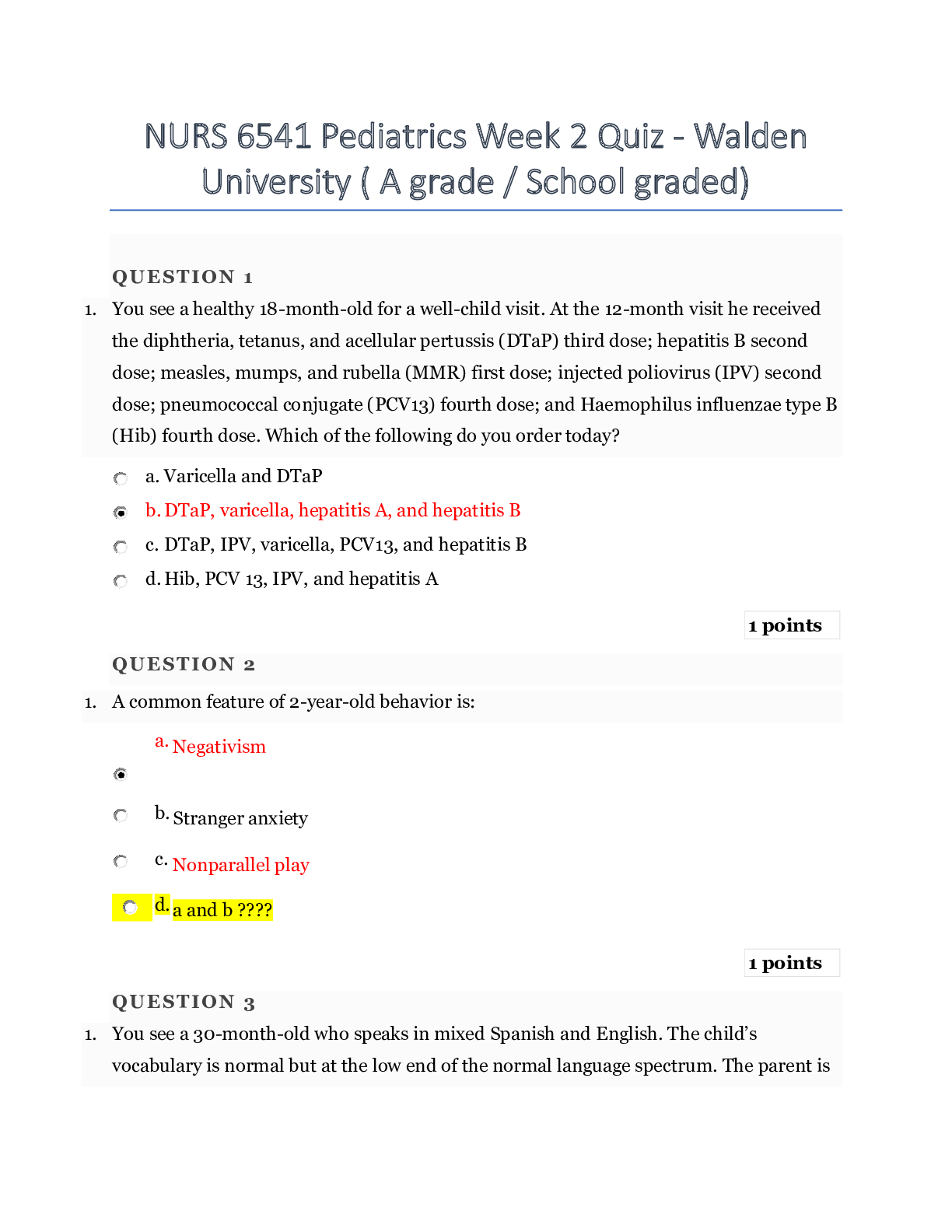
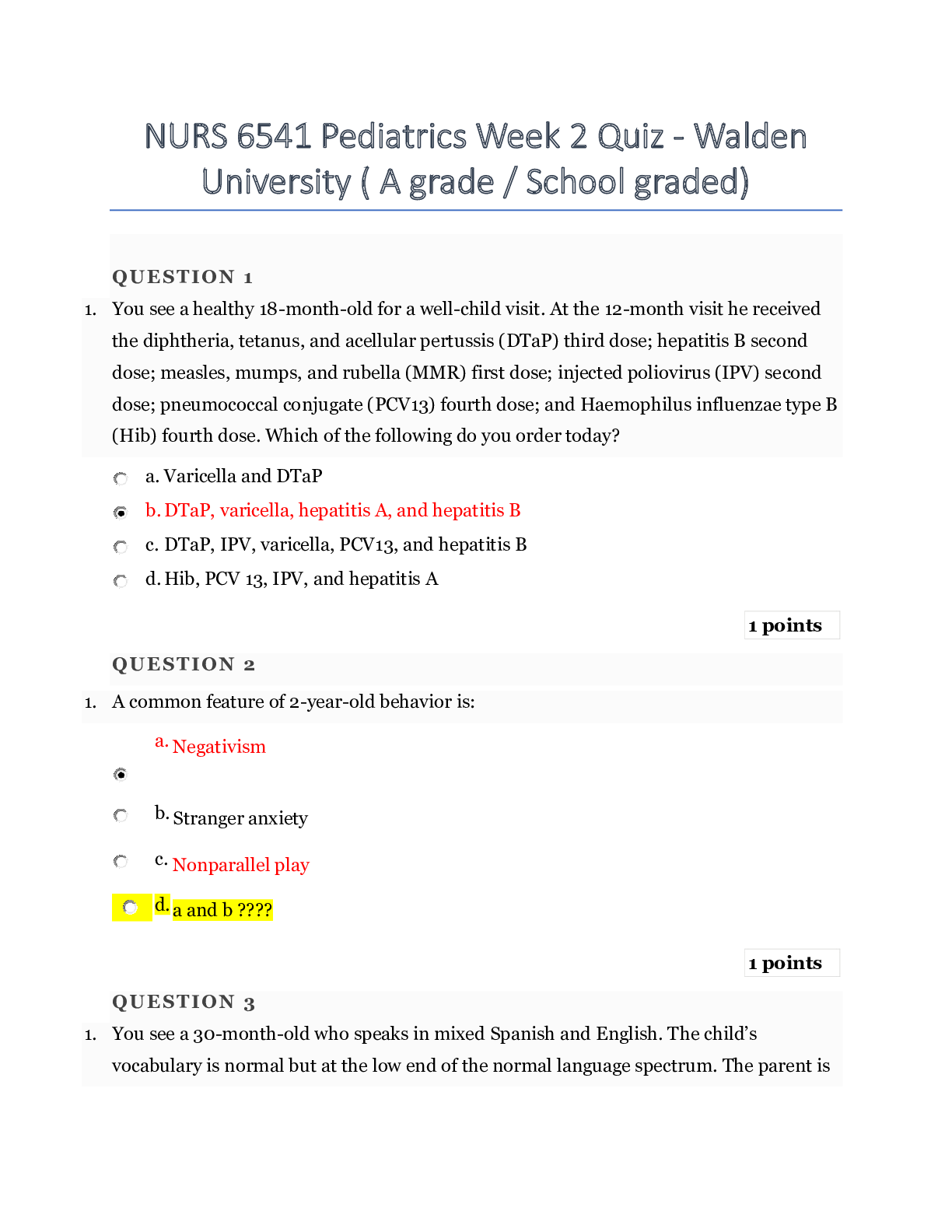
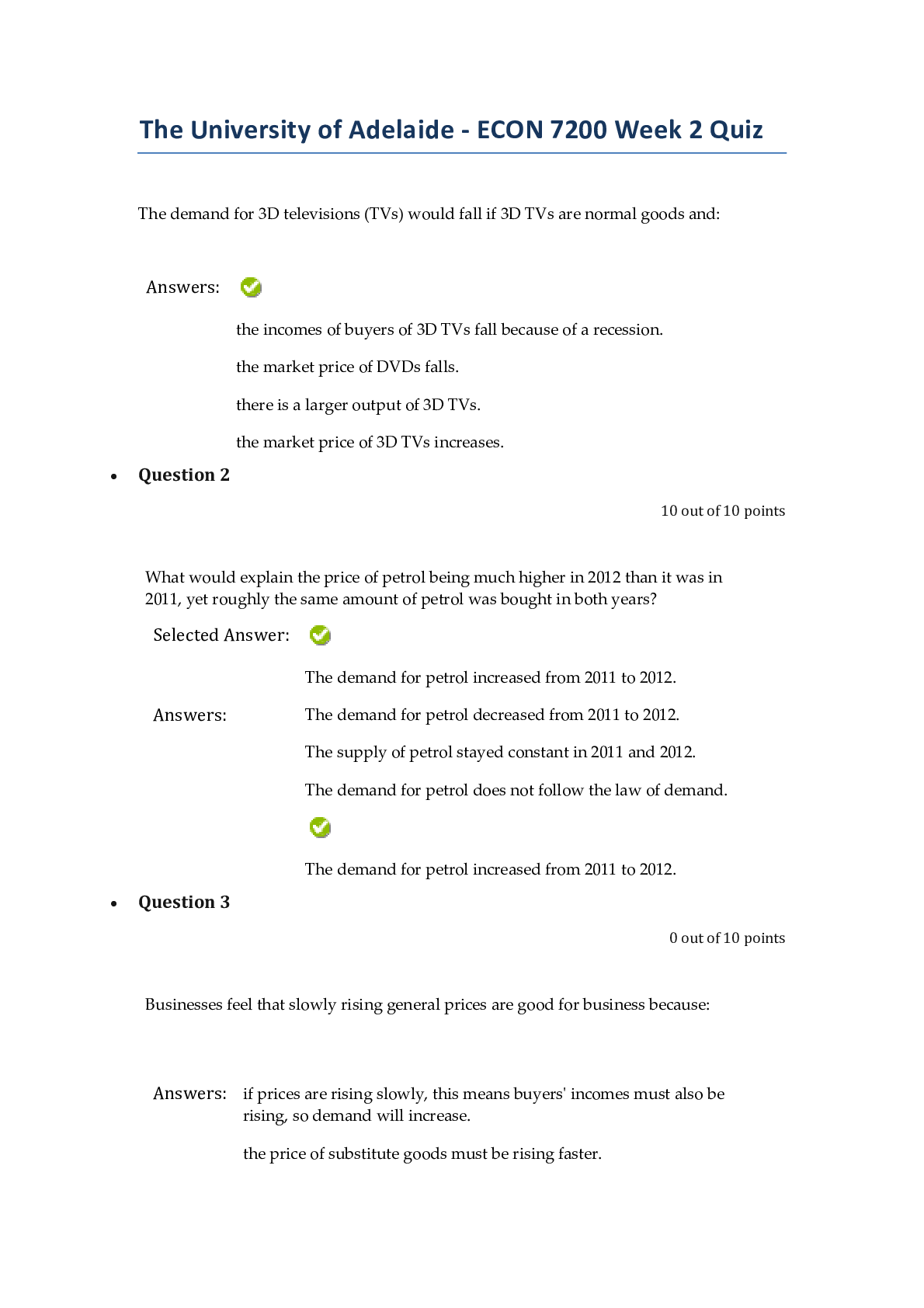


.png)

